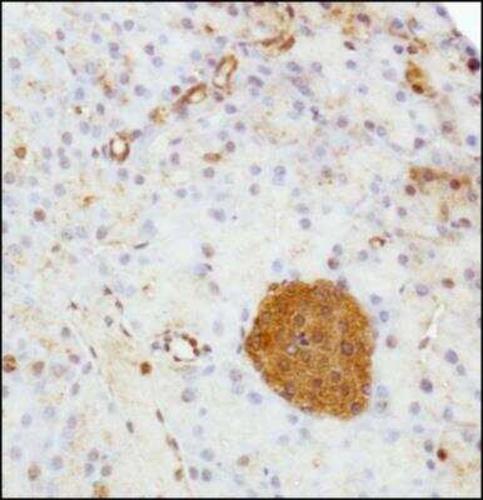PAI1 (SERPINE1) Rabbit Polyclonal Antibody
Frequently bought together (3)
Recombinant protein of human serpin peptidase inhibitor, clade E (nexin, plasminogen activator inhibitor type 1), member 1 (SERPINE1)
USD 439.00
Transient overexpression lysate of serpin peptidase inhibitor, clade E (nexin, plasminogen activator inhibitor type 1), member 1 (SERPINE1), transcript variant 1
USD 396.00
Other products for "PAI1"
Specifications
| Product Data | |
| Applications | IHC, WB |
| Recommended Dilution | Immunocytochemistry/ Immunofluorescence: 5 - 10 ug/ml, Immunohistochemistry: 1:50 - 1:100, Immunohistochemistry-Frozen: 1:50 - 1:100, Immunohistochemistry-Paraffin: 1:50 - 1:100, Western Blot: 1.0 ug/ml, ELISA |
| Reactivities | Human, Mouse, Rat |
| Host | Rabbit |
| Clonality | Polyclonal |
| Immunogen | A synthetic peptide made to an internal portion of the human PAI1/Serpine 1 protein (between residues 300-400) [UniProt P05121] |
| Formulation | PBS, 0.05% Sodium Azide. Store at 4C short term. Aliquot and store at -20C long term. Avoid freeze-thaw cycles. |
| Concentration | lot specific |
| Purification | Immunogen affinity purified |
| Conjugation | Unconjugated |
| Storage | Store at -20°C as received. |
| Stability | Stable for 12 months from date of receipt. |
| Predicted Protein Size | 45 kDa |
| Gene Name | serpin family E member 1 |
| Database Link | |
| Background | PAI-1 and PAI-2 (for plasminogen activator inhibitor-1 and -2) are members of the serpin serine proteinase inhibitor family. PAI-1 and PAI-2 have been shown to regulate uPA (urokinase-type plasminogen activator) and tPA (tissue plasminogen activator), resulting in the inhibition of proteolytic activity. Members of the serpin family generally complex with their target proteinases, then disassociate slowly into cleaved species that fold into stable inactive forms. PAI-1 can fold into the inactive state without cleavage, resulting in the latent form of PAI-1. Activity can be restored to the latent form of PAI-1 through denaturation and renaturation. PAI-2 occurs in secreted and cytosolic forms through facultative polypeptide translocation. uPA is a serine proteinase that is a member of the trypsin family. It is responsible for the cleavage of plasminogen at the Arg-Val bond to produce plasmin. uPA consists of two chains designated A and B. The A chain can be cleaved, resulting in low and high molecular mass forms of uPA. |
| Synonyms | PAI; PAI-1; PAI1; PLANH1 |
| Reference Data | |
| Protein Families | Druggable Genome, Secreted Protein |
| Protein Pathways | Complement and coagulation cascades, p53 signaling pathway |
Documents
| Product Manuals |
| FAQs |
| SDS |
{0} Product Review(s)
0 Product Review(s)
Submit review
Be the first one to submit a review
Product Citations
*Delivery time may vary from web posted schedule. Occasional delays may occur due to unforeseen
complexities in the preparation of your product. International customers may expect an additional 1-2 weeks
in shipping.






























































































































































































































































 Germany
Germany
 Japan
Japan
 United Kingdom
United Kingdom
 China
China





